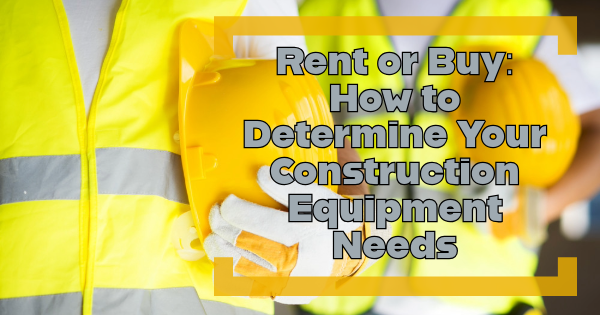When embarking on a new construction project, one of the primary considerations is whether to rent or buy construction equipment. This decision can significantly impact your project’s budget and timeline, making it crucial to evaluate your current and future needs carefully. With the heavy equipment rental market valued at $195.04 billion as of 2023, according to Insight Ace Analytic, understanding the nuances of renting versus buying is more pertinent than ever. This blog will guide you through the factors you need to weigh to make an informed choice.
Duration of Equipment Usage
First, consider the frequency and duration of your equipment usage. If your construction projects are sporadic or seasonal, renting might be the more cost-effective option. A heavy equipment rental allows you to access the latest machinery without the burden of long-term financial commitment or maintenance costs. However, if you’re involved in continuous projects or have a pipeline of work, buying might provide greater control and long-term value, ensuring equipment availability whenever needed.
Cost of Renting vs Buying
Next, evaluate the total cost of ownership versus the rental expense over time. Purchasing equipment involves an initial financial outlay but may offer tax advantages like depreciation. Additionally, owning equipment can help you build equity and stable assets. Conversely, renting equipment keeps your expenses more predictable and scalable, though some argue that these costs, accumulated over many projects, might approach or exceed the cost of purchase. Weighing these financial implications is crucial in your decision-making process.
Specialized Equipment Needs
Lastly, consider technological advancements and your need for specialized equipment. Given the rapid innovation in the heavy equipment rental industry, owning machinery might mean dealing with outdated technology after a few years. Renting provides access to newer models and specialized equipment that can enhance project efficiency and safety. This option is particularly beneficial if your projects require equipment with varying capabilities or if you want to test a new model before considering a purchase.
Determining whether to rent or buy construction equipment depends on a mix of factors such as usage frequency, financial implications, and technology needs. By evaluating these aspects carefully, you can align your equipment strategy with your project goals and financial resources. Ultimately, the key is to choose an option that maximizes productivity and complements the growth trajectory of your construction business. For more information, contact Sync Aggregate today!

